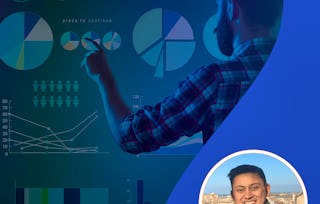This is the first course in the four-course specialization Python Data Products for Predictive Analytics, introducing the basics of reading and manipulating datasets in Python. In this course, you will learn what a data product is and go through several Python libraries to perform data retrieval, processing, and visualization.

Basic Data Processing and Visualization

Basic Data Processing and Visualization
This course is part of Python Data Products for Predictive Analytics Specialization


Instructors: Julian McAuley
22,289 already enrolled
Included with
200 reviews
Recommended experience
What you'll learn
Develop data strategy and process for how data will be generated, collected, and consumed
Load and process formatted datasets such as CSV and JSON.
Deal with data in various formats (e.g. timestamps, strings) and filter and “clean” datasets by removing outliers etc.
Basic experience with data processing libraries such as numpy and data ingestion with urllib, requests
Skills you'll gain
Details to know

Add to your LinkedIn profile
See how employees at top companies are mastering in-demand skills

Build your subject-matter expertise
- Learn new concepts from industry experts
- Gain a foundational understanding of a subject or tool
- Develop job-relevant skills with hands-on projects
- Earn a shareable career certificate

There are 5 modules in this course
This week, we will go over the syllabus and set you up with the course materials and software. We will introduce you to data products and refresh your memory on Python and Jupyter notebooks.
What's included
6 videos6 readings2 assignments2 discussion prompts
This week, we will learn how to load in datasets from CSV and JSON files. We will also practice manipulating data from these datasets with basic Python commands.
What's included
6 videos3 assignments1 discussion prompt
This week, our goal is to understand how to clean up a dataset before analyzing it. We will go over how to work with different types of data, such as strings and dates.
What's included
4 videos3 assignments1 discussion prompt
In this last week, we will get a sense of common libraries in Python and how they can be useful. We will cover data visualization with numpy and MatPlotLib, and also introduce you to the basics of webscraping with urllib and BeautifulSoup.
What's included
5 videos4 assignments1 peer review2 discussion prompts
Create your own Jupyter notebook with a dataset of your own choosing and practice data manipulation. Show off the skills you've learned and the libraries you know about in this project. We hope you enjoyed the course, and best of luck in your future learning!
What's included
1 video2 readings1 peer review1 discussion prompt
Earn a career certificate
Add this credential to your LinkedIn profile, resume, or CV. Share it on social media and in your performance review.
Instructors


Offered by
Explore more from Data Analysis
 Status: Free Trial
Status: Free TrialUniversity of California San Diego
 Status: Free Trial
Status: Free TrialMicrosoft
 Status: Free Trial
Status: Free Trial Status: Free Trial
Status: Free TrialUniversity of California, Davis
Why people choose Coursera for their career

Felipe M.

Jennifer J.

Larry W.

Chaitanya A.
Learner reviews
- 5 stars
63%
- 4 stars
21.50%
- 3 stars
7%
- 2 stars
3.50%
- 1 star
5%
Showing 3 of 200
Reviewed on Jun 29, 2022
Great content. When you apply yourself to this course , there's no "dirty" data you can't handle.
Reviewed on Jun 29, 2019
Excellent to start your career in machine learning!!!
Reviewed on Aug 2, 2020
It was a good Data Visualization course. I really liked it. It's a good beginner course to start with Data Visualization.

Open new doors with Coursera Plus
Unlimited access to 10,000+ world-class courses, hands-on projects, and job-ready certificate programs - all included in your subscription
Advance your career with an online degree
Earn a degree from world-class universities - 100% online
Join over 3,400 global companies that choose Coursera for Business
Upskill your employees to excel in the digital economy
Frequently asked questions
To access the course materials, assignments and to earn a Certificate, you will need to purchase the Certificate experience when you enroll in a course. You can try a Free Trial instead, or apply for Financial Aid. The course may offer 'Full Course, No Certificate' instead. This option lets you see all course materials, submit required assessments, and get a final grade. This also means that you will not be able to purchase a Certificate experience.
When you enroll in the course, you get access to all of the courses in the Specialization, and you earn a certificate when you complete the work. Your electronic Certificate will be added to your Accomplishments page - from there, you can print your Certificate or add it to your LinkedIn profile.
Yes. In select learning programs, you can apply for financial aid or a scholarship if you can’t afford the enrollment fee. If fin aid or scholarship is available for your learning program selection, you’ll find a link to apply on the description page.
More questions
Financial aid available,
¹ Some assignments in this course are AI-graded. For these assignments, your data will be used in accordance with Coursera's Privacy Notice.

